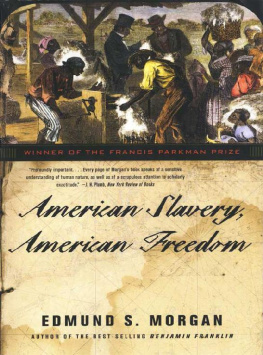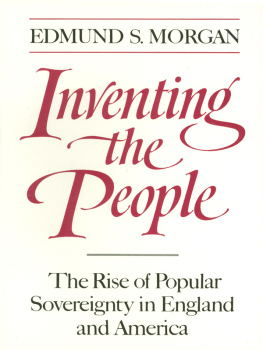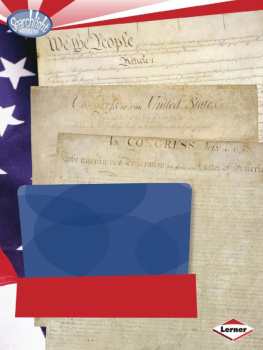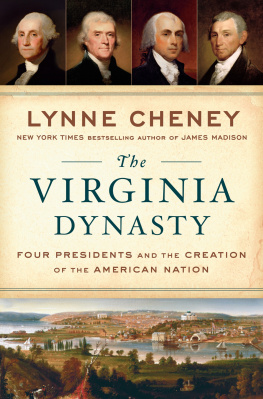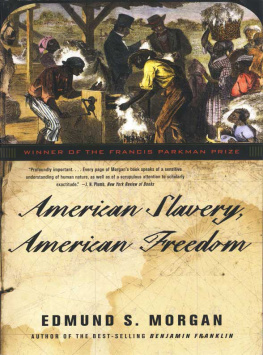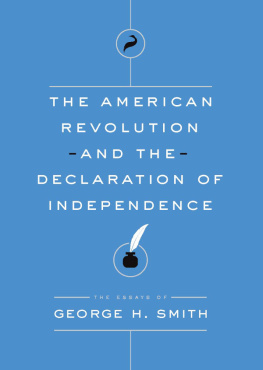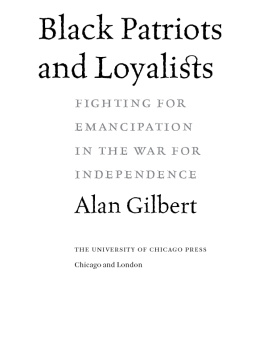OTHER BOOKS BY EDMUND S. MORGAN
Benjamin Franklin
The Puritan Family: Religion and Domestic Relations in Seventeenth-Century New England
Virginians at Home: Family Life in the Eighteenth Century
The Stamp Act Crisis: Prologue to Revolution (with Helen M. Morgan)
The Birth of the Republic
The Puritan Dilemma: The Story of John Winthrop
The Gentle Puritan: A Life of Ezra Stiles
Visible Saints: The History of a Puritan Idea
Roger Williams: The Church and the State
So What about History?
EDITED WORKS
Prologue to Revolution: Sources and Documents on the Stamp Act Crisis
The Diary of Michael Wigglesworth: The Conscience of a Puritan
Puritan Political Ideas
The Founding of Massachusetts: Historians and the Sources
The American Revolution: Two Centuries of Interpretation


FOR HELEN
as always
Contents


This book has been a good many years in the making, and many people have helped me to write it. Helen M. Morgan, as always, has helped much more than anyone else. She has worked with me from the beginning, and every draft of every chapter has had the benefit of her critical scrutiny. If the final result has any clarity of thought or expression, it is because of her patience and perception.
Parts of the book, in a different form, were delivered as the Commonwealth Lectures at the University of London in 1970. Part of in Slavery and Freedom: The American Paradox, in the Journal of American History in 1972. In these preliminary formulations I was able to benefit from the criticism of several colleagues and friends. F. J. Fisher, Jack Hexter, Peter Laslett, Lawrence Stone, and Joan Thirsk helped me to avoid some errors in what I have to say about English history. And I have profited in a variety of ways from discussions with Charles Boxer, John M. Blum, David B. Davis, William N. Parker, the late David Potter, and C. Vann Woodward.
For help in avoiding some of the pitfalls in compiling the statistical tables (I surely have not avoided all of them), I am grateful to a number of people: to John McCarthy and to Robert Luft for programming information for computer analysis, and to Lois Carr, Gloria Main, and Russell Menard, who read the first draft of the Appendix and gave valuable advice about it. I also wish to thank E. J. Hundert, John McCusker, and Robert V. Wells for suggestions offered by correspondence on matters of common interest. At W. W. Norton and Company, James L. Mairs and George Brock-way have given the kind of editorial assistance that every author hopes for.
I owe many institutional debts. Initial research for the book was begun during a sabbatical leave from Yale University in the year 196263, with assistance from the Social Science Research Council and the American Council of Learned Societies. Subsequently Yales policy of triennial leaves of absence gave me two more semesters of leave, and I enjoyed a third as Johnson Research Professor at the University of Wisconsin.
Many libraries and many librarians have helped me. The Virginia State Library not only made their collections of manuscripts available but provided microfilms of the most valuable county court records. At Colonial Williamsburg Edward Riley has made the Research Library the most effective working library of Virginia history that I know of. His hospitality went far beyond the call of duty. The staff of the Virginia Historical Society in Richmond and of the Alderman Library in Charlottesville were uniformly helpful. But most of the research and writing were done in the Yale Library and the Henry E. Huntington Library in San Marino, California, which has become a home away from home for many scholars besides myself. It would be hard to measure the benefits of conversations there with old friends and new. A historian could scarcely ask for better places to work than I have enjoyed, and I am deeply grateful to those who have made them so.
January, 1975 E. S. M.

In recent years the study of slavery in the United States has concentrated on the independent culture that men and women from Africa were able to preserve or create in America, despite their forcible dislocation and subjection. Studies have shown their success in a variety of ways: maintaining family ties that were subject to dissolution at the whim of their owners; African ways of dancing, singing, and bodily adornment; the creation of new and of hybrid forms of music; the building of a pan-African culture or cultures from the many disparate peoples thrown together in a strange land. The success of Afro-Americans in maintaining a life of their own has dictated a recognition that slavery is always a negotiated relationship. Human beings find ways of asserting their humanity despite all efforts to reduce them to mere animals without a will of their own. Slavery can never be as absolute as slaveowners might claim it to be and wish it to be and legislate it to be.
While studies of slavery have thus disclosed the history of a rich black culture in America, dating back to the first settlements, other studies of American separation from Great Britain have shown the development of expanded ideas of freedom among the free. As colonists of the British Empire, free Americans had accepted a limited control of their activities by governors sent from Britain under laws passed by the British Parliament. Their own governments had derived their authority from the King of England. When they dissolved the connection and rested government on the consent of the governed, they opened the doors to freedom wider than they realized at the time. They recognized the apparent contradiction between their proclamations of equality and liberty and their continuing possession of slaves, and hoped at some undesignated time in the future to resolve it. In the end, of course, it required a Civil War.
It required a civil war because slavery and freedom are irreconcilable opposites. The negotiated relationship between master and slave never approached a negotiation between equals. The slave might be able to win privileges by behavior beyond the masters control that would reduce work done and profit gained: feigned (or real) sickness, running away for a time, deliberate clumsiness, what today would be called sabotage. Some slaves may even have won eventual freedom in return for a number of years of truly conscientious labor. There could be grades of status within slavery, some slaves winning more privileges than others. But there was no halfway house between slavery and freedom, no set of steps that led progressively from one to the other.
Within the ranks of the free there could be much wider variation of status. The rich could always command the services of the poor. Freedom might be the only thing they had in common. But whatever powers the rich might exercise, however dependent the poor might become upon them, no one mistook poverty or dependence for slavery. There were, as we shall see, proposals for enslaving the poor, but the proposals themselves were a recognition that the poor were not slaves, in fact or in law.
Next page
